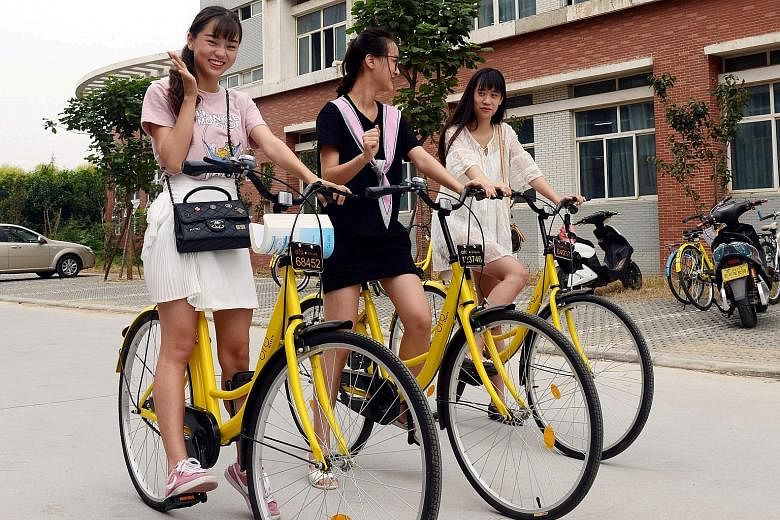HONG KONG • China's tech industry giants are ploughing hundreds of millions of dollars into what they are betting will be the country's next big Internet craze - "Uber for bikes".
A symbol of China's cities long before a boom in cars, snarling traffic and smog, the humble bicycle is making a comeback. Start-ups equipped with smartphone apps, Global Positioning System and scannable codes are selling cheap bike- sharing services to city dwellers as the way to beat jams on China's most congested streets.
The rush to invest in car ride-hailing apps in China peaked with Didi Chuxing's acquisition of Uber's China arm in August, creating a US$35 billion (S$48.7 billion) giant.
Now Shanghai's MoBike and Beijing-based ofo - both use customised Anglicised branding - have raised big money from bullish investors on the hunt for China's next tech "unicorn".
MoBike, backed by Chinese Internet giant Tencent Holdings among others, closed a US$100 million funding round this month, two sources told Reuters.
Ofo raised US$130 million this month from investors including Didi, smartphone-maker Xiaomi and United States hedge fund Coatue, which has backed Facebook and Google.
"We did not expect there to be so many investors and we did not expect this field to get so hot," ofo co-founder Zhang Siding, 26, told Reuters in an interview.
Both MoBike and ofo claim to be the first of their kind in the world, raising the question for them and investors of whether the model could be replicated in other countries.
In the meantime, the custom- made "smart bikes" stand out in a country estimated to have close to 400 million bicycles. MoBikes have orange-red inner wheels with fewer spokes and airless tyres to reduce maintenance, while ofo's yellow bikes have a lower-tech, retro look.
Mr Zhang was one of five Beijing students who launched ofo last year. The firm is charging one yuan (20 Singapore cents) per hour for bicycle rental.
Ms Yu Xiaoxia, 29, a teacher in the southern Chinese city of Guangzhou who pays one yuan per half-hour to use MoBike, said: "I find it very convenient, because road traffic is so bad, especially during rush hour."
The ride is worth it for Ms Yu, but it is not all smooth. "The bikes are heavy to pedal, and it is also harder to find a vacant bike now that it (MoBike) is gaining more users," she said.
MoBike chief executive and co-founder Wang Xiaofeng, formerly the Shanghai head of Uber, said that if each of his firm's bikes were used four times a day, the company would recoup the cost of the bike in two to three months.
It remains to be seen whether the bike-sharing businesses will follow the path of bruising competition, heavy investment and ultimate consolidation seen in the taxi-hailing sector. Didi now reigns supreme after absorbing a local rival before cutting a deal to take over Uber China.
In the meantime, the business model faces challenges, both operational and strategic.
Risks of theft, vandalism and irresponsible users who park bikes off-limits are the biggest everyday headaches for both firms.
The services are also prone to the caprices of regulators, an issue that has dogged China's taxi-hailing market, where firms still face tight restrictions on drivers.
Another issue could be the very design of Chinese cities, adapted to meet booming private-car ownership over the last two decades.
"Bike-sharing is a good direction from a planning point of view. But many Chinese cities have been built... prioritising vehicles," said Assistant Professor Sylvia He at the Institute of Future Cities at the Chinese University of Hong Kong.
"There are just not enough facilities for bikes," she added.
REUTERS

